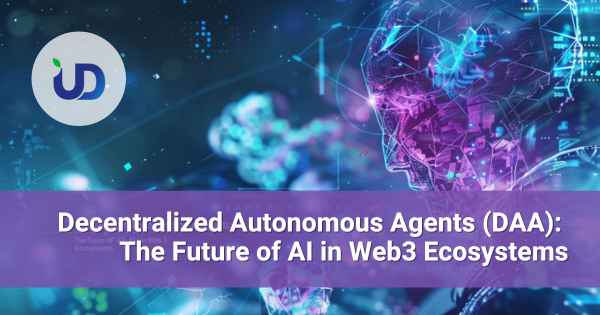Decentralized Autonomous Agents (DAA): The Future of AI in Web3 Ecosystems
As the world shifts towards decentralized systems, the integration of artificial intelligence (AI) with blockchain technology is paving the way for innovative solutions. At the forefront of this transformation are Decentralized Autonomous Agents (DAAs), which promise to revolutionize how we interact with digital ecosystems. This article explores what DAAs are, their applications, challenges, and their potential impact on the future of Web3.
Understanding Decentralized Autonomous Agents
What Are DAAs?
Decentralized Autonomous Agents (DAAs) are intelligent software entities that operate autonomously on blockchain networks. Unlike traditional AI agents, which often rely on centralized systems, DAAs leverage smart contracts and decentralized protocols to function independently. This autonomy allows them to make decisions based on real-time data without human intervention, enhancing efficiency and reliability.
The Technology Behind DAAs
DAAs are built on a combination of blockchain technology, smart contracts, and machine learning algorithms. Blockchain provides a secure and transparent environment for transactions, while smart contracts automate processes by executing predefined rules. Machine learning enables DAAs to analyze vast amounts of data, learn from interactions, and adapt their behavior over time.
Autonomy and Decision-Making
Independent Operations
One of the defining features of DAAs is their ability to operate independently. They can execute tasks such as trading assets, managing digital identities, or providing customer support without requiring constant oversight. For example, an autonomous trading bot can analyze market trends and execute trades based on its algorithms, maximizing profits while minimizing risks.
Real-World Examples
Several projects are already utilizing DAAs in various capacities. For instance, decentralized finance (DeFi) platforms employ DAAs to automate yield farming strategies or manage liquidity pools. Similarly, in decentralized insurance, DAAs can assess claims and execute payouts based on predefined criteria, streamlining processes that traditionally require human intervention.
Applications in Various Industries
Finance
In the financial sector, DAAs can enhance trading strategies by analyzing market data and executing trades with precision. They can also facilitate peer-to-peer lending by assessing borrower risk through automated credit scoring mechanisms.
Supply Chain Management
DAAs can revolutionize supply chain processes by providing real-time tracking of goods and automating inventory management. By leveraging blockchain’s transparency, they ensure that all parties have access to accurate information about product provenance.
Healthcare
In healthcare, DAAs can manage patient records securely on a blockchain while ensuring compliance with regulations. They can also automate appointment scheduling and patient follow-ups, improving overall efficiency in healthcare delivery.
Gaming
The gaming industry is also ripe for disruption through DAAs. They can create dynamic in-game economies where players engage with autonomous agents that manage virtual assets or facilitate transactions seamlessly.
Enhancing User Interaction
Personalized Experiences
DAAs have the potential to significantly improve user experiences in Web3 environments. By analyzing user behavior and preferences, they can offer personalized recommendations for services or products tailored to individual needs.
Conversational AI Integration
Integrating conversational AI with DAAs allows for natural language interactions between users and agents. This capability enhances user engagement by providing instant support and guidance within decentralized applications (dApps).
Challenges and Ethical Considerations
Security Risks
While DAAs offer numerous benefits, they also pose security risks. Vulnerabilities in smart contracts or AI algorithms could be exploited by malicious actors, leading to significant financial losses or data breaches.
Regulatory Concerns
The autonomous nature of DAAs raises regulatory questions regarding accountability and liability. As these agents operate independently, determining who is responsible for their actions becomes complex.
Ethical Implications
The deployment of DAAs necessitates careful consideration of ethical implications. Ensuring transparency in decision-making processes and preventing bias in AI algorithms are crucial for maintaining trust among users.
The Future Landscape of Web3 with DAAs
Emerging Trends
The future of Web3 is likely to see increased integration of DAAs across various sectors. As AI technology advances and blockchain ecosystems mature, we may witness new business models that leverage the strengths of both technologies.
Opportunities Ahead
The rise of DAAs presents exciting opportunities for entrepreneurs and developers looking to innovate within decentralized frameworks. By harnessing the power of autonomous agents, businesses can create more efficient systems that enhance user experiences while reducing operational costs.
Decentralized Autonomous Agents represent a significant leap forward in the evolution of Web3 ecosystems. By combining the capabilities of AI with the transparency and security of blockchain technology, DAAs are set to transform how we interact with digital services across various industries. While challenges remain, the potential benefits far outweigh the risks, making this an exciting area for exploration and innovation in the coming years. This article structure provides a comprehensive overview while maintaining an engaging tone suitable for readers interested in understanding how Decentralized Autonomous Agents are shaping the future of Web3 ecosystems.
UD is a leading blockchain and network security solution provider in Hong Kong
We are dedicated to assisting enterprises in advancing their businesses through innovative blockchain technology, ushering from Web 2.0 to Web 3.0





